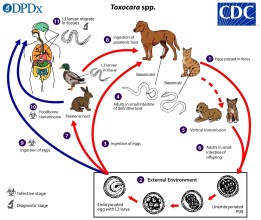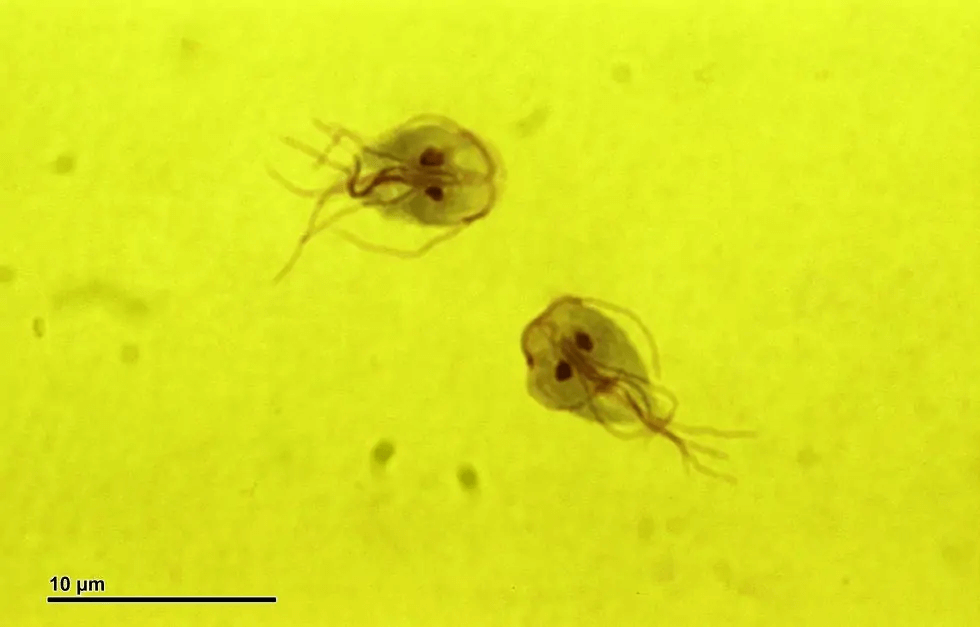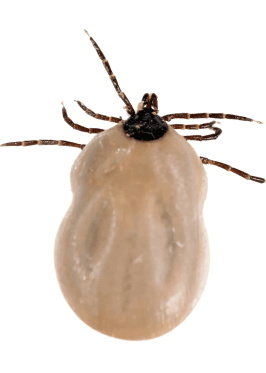Dog Park Parasitic Risks
Off-leash dog parks are rapidly growing in popularity. They provide dogs with an opportunity to exercise, play fetch, and socialize with other dogs. However, there are often no requirements for prior veterinary care which means that your dog may be interacting with dogs that are not up to date on vaccines or parasite prevention. Therefore, as interest in increases, so does the risk of your pet catching unwanted parasites. Some of these parasites can even be spread to humans and pose a significant health risk.
New Dog Park Study Regarding GI Parasites in Dogs
A recent study collected fecal samples from over 3,000 dogs that frequent dog parks in over 30 metropolitan areas across the United States. These samples were analyzed via two different testing methods, and the owners filled out a questionnaire providing information regarding their dog and any anti-parasitic medications they were giving.
The new dog park safety study revealed that a whopping 85% of the dog parks had at least one infected dog. Overall, one in five dogs (20%!) was found to be positive for intestinal parasites. These parasites were more commonly detected in younger dogs, but parasites were identified in dogs of all ages. Around 68% of the dogs were reported to be taking parasite preventatives and these dogs were significantly less likely to be infected.
Dogs Shed Parasitic Eggs While Exhibiting No Clinical Signs of Being Infected

Most dogs become infected with GI parasites by ingesting the parasite eggs or larvae. While infections can become dangerous, the intestinal parasite infections are often subclinical, meaning that they do not show any clinical signs. This means that the dogs are shedding parasitic eggs into the environment, acting as a source of infection of other dogs and even humans.
There are common misconceptions regarding parasite infection in dogs, including thinking only puppies are susceptible and that certain lifestyles can prevent infections. All dogs are susceptible to GI parasites at any time in their life regardless of age and lifestyle. Even if you do not frequent dog parks, your dog can pick up parasites just by walking around the block.
42% of puppies under one year of age were positive for roundworms or Giardia. Approximately half of the sampled parks were positive for hookworms, whipworms, or roundworms. But what happens when a dog is infected with these parasites?
Parasite Infection in Dogs
Giardia

Giardia is a protozoan parasite that often goes undetected because the infections do not always lead to clinical signs and the parasite only sheds cysts intermittently. Therefore, a dog can be infected before they get sick while spreading the parasite to other pets. Giardia is found throughout the entire US, with no preference for specific regions. Transmission of Giardia is typical via infected soil, water, feces, or other animals. Treatment includes a medication called Metronidazole in addition to standard deworming medicines.
Roundworms

Roundworms are one of the most common parasites in young dogs. Unlike some other parasites, young dogs have a higher risk, and dogs can develop an age-related resistance to infections. Roundworms are long, white, thick worms that can reach several inches long. They live in the intestines and can lead to GI upset and malnourishment. Young stray puppies with a pot-bellied appearance are the poster children for roundworm infections. Roundworms are susceptible to most standard deworming medications.
These parasites also present a dangerous zoonotic threat. Humans can become infected via ingesting eggs or eating undercooked meat of infected animals. After being consumed, the larvae penetrate the intestinal wall and can be carried in the bloodstream to other organs such as the liver, heart, brain, muscle, or eyes. While most infections are asymptomatic, the larvae can cause severe inflammation and mechanical damage to these organs.
Hookworms

Hookworms are one of the most severe GI parasites in dogs. They are small thin worms that attach to the lining of the intestines and feed on blood. Severe hookworm infections can lead to dangerous levels of blood loss and anemia, requiring a blood transfusion to fix. Hookworms are susceptible to most standard deworming medications; however, their lifecycle treatment may need to be repeated at regular intervals.
Hookworms also present a significant danger to humans. Hookworm larvae live in soil, and the most common way a human is infected is via their exposed skin when walking through or sitting in an infested area. The resulting syndrome is called cutaneous larval migrans (CLM). As the larvae burrow through the skin, they can cause significant irritation and secondary infection.
Whipworms

Whipworms can be one of the most frustrating parasites to treat. They are only about ¼ inch long, and they live in the colon and attach to the mucosal lining. Weight loss and mucousy diarrhea are the most common signs of serious whipworm infections in dogs. Affected animals need to be treated several times on a very specific schedule due to the parasite’s lifecycle. Luckily, they are also susceptible to most standard deworming medications.
Coccidia

Coccidia is another protozoan parasite that lives in the intestinal tract of dogs. These parasites are single-celled organisms and can only be visualized under a microscope. Due to their microscopic appearance, infections can go unnoticed, thereby leading to undetected spread. Coccidia require a specific de-wormer for treatment- standard de-wormers will not treat this parasite.
Tapeworms

Tapeworms are flat white parasites that also live in the intestinal tract of dogs. These are transmitted by ingesting fleas that are contaminated with them. These parasites can irritate the anus as they shed their segments which resemble grains of rice. Severe infection can result in poor nutrition absorption or an intestinal blockage, although severe side effects on infection are rare.
Tapeworms also require a specific medication for treatment.
Non-Gastrointestinal Parasite Risks
Heartworms
Another parasitic infection of dogs that frequent the outdoors is heartworm disease. Dogs obtain heartworm disease by being bitten by an infected mosquito. Adult worms are large roundworm parasites that grow and reproduce in the lung and heart’s blood vessels. Severe infections can cause severe diseases of the lungs, heart, or other organs. If the worm burden is significant enough, the worms can cause the vessels’ blockages, resulting in instant death.

While heartworms are more prevalent in the southern United States, they do exist in all 50 states. Treatment for heartworms can be dangerous and expensive as the process needs to be as slow as possible to prevent the dying worms from clogging the blood vessels. Three very painful deep muscular injections are given over several weeks, along with oral antibiotics and oral steroids. The dog will also need chest x-rays performed to check for an enlarged heart. Dogs treated for heartworm disease need to be on strict rest for several months to avoid dislodging the worms from the heart/lungs to other areas of the body. Heartworm disease is one of the most preventable parasitic diseases for dogs. Heartworm prevention consists of either a monthly chewable tablet or an annual injection.
Although it is a rare occurrence, heartworm disease can also be spread to humans if the mosquito is exposed to a heartworm larva from an infected dog. This larva is then injected into the human and can travel and reproduce in the lungs.
Fleas
Flea infestations are very itchy and can lead to skin rashes that become infected and make dogs quite miserable. While the adult fleas live on animals, they can lay hundreds of eggs in the environment, developing into adults. Several topical and oral medications can be used to treat adult fleas, but the environment also needs to be specially treated.
Ticks
Ticks are heaviest in wooded areas, but they can be found even in your backyard as songbirds can carry them. Ticks can bite dogs as well as humans and can transmit serious diseases to both. Humans can protect themselves by wearing special clothing, and dogs can be protected by using topical or or al tick preventatives. One common misconception is that most ticks are easily seen with the naked eye. In actuality, the nymph form of the tick lifecycle is about the size of a pinhead and can still transmit deadly diseases. The most common tick diseases seen in Wisconsin include Lyme, Anaplasmosis, and Ehrlichiosis. There are several topical and oral medications that can be used to treat ticks.

Parasite Diagnosis
If you notice any clinical signs of vomiting, diarrhea, unexplained weight loss, coughing, or lethargy, your dog should be seen by a veterinarian as soon as possible.
The most common way to check for gastrointestinal parasites is through a fecal sample. The fecal sample is spun down via a centrifuge, and a sample is placed under the microscope to check for parasitic eggs. Adult worms may also be visualized in the fecal sample. Yearly fecal samples are recommended for all adult dogs.
Heartworms and tick-borne diseases are diagnosed via blood tests that can either be run in-house or sent to a laboratory. Yearly heartworm and tick disease testing is recommended for all adult dogs.
Preventing Infections
The best way to prevent parasitic infections in your dog is to attend annual veterinary visits. Fecal yearly tests and blood tests can help catch any infection in its early stages before your pet develops symptoms, leading to a more successful treatment.
Your dog should also be on year-round heartworm, GI parasite, and flea/tick preventatives. There are misconceptions that dogs only need to take preventatives during warmer months when fleas, ticks, and mosquitos are more prevalent; however, veterinarians strongly recommend year-round protection. Many products on the market provide coverage for one or all of these parasites – ask your veterinarian which product is recommended for your dog.
About Brook-Falls
Brook-Falls Veterinary Hospital and Exotic Care is dedicated to providing quality care to all companion pets and exotic animals. Brook-Falls is a Menomonee Falls, WI-based full-service veterinary hospital with an extensive range of comprehensive medical, dental, diagnostic, and surgical services to meet the varying needs of all patients. Brook-Falls Veterinary also offers informational and educational media and seminars for pet owners by way of blogs, digital TV series (Expert Veterinary Television), e-books, whitepapers, infographics, and more.
For more information, contact Brook-Falls Veterinary Hospital & Exotic Care, Inc.


